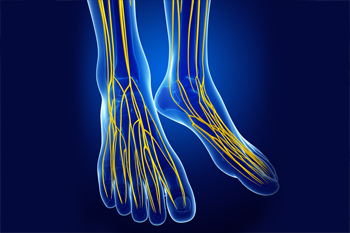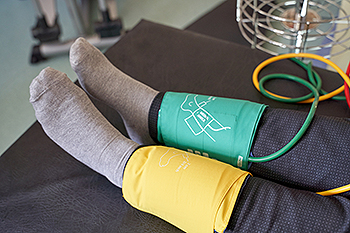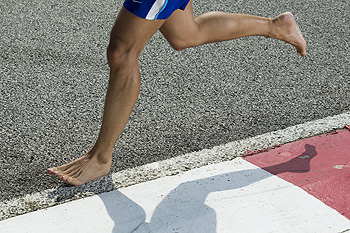Items filtered by date: January 2022
Vascular Testing to Help Determine Peripheral Arterial Disease
Some of the symptoms of peripheral arterial disease (PAD) can include pain, weakness, numbness, loss of hair on your legs, bluish-colored skin on the feet or calves, poor toenail growth, pain or cramps in your legs when walking, and wounds on your feet and legs that are slow to heal. To properly diagnose this vascular condition, your podiatrist may need to know your Ankle Brachial Index (ABI). Simply put, the ABI compares the blood pressure in the arm with the blood pressure in the ankle. Blood pressure during the heart’s contracting/pumping (systolic) phase is slightly higher in the ankle than it is in the arm for healthy people. Determining the ABI is a very simple and non-invasive procedure, using just a blood pressure cuff and a Doppler instrument. The patient lies down and rests for ten minutes. Then, blood pressure is taken at the upper arm, followed by the ankle. The ankle’s blood pressure is then divided by the arm’s blood pressure. An ABI ratio between 1.0 to 1.4 is considered normal. An ABI ratio of 0.9 or less usually indicates PAD—with moderate cases typically ranging between 0.4 to 0.7, and more severe cases falling below 0.4. If you are experiencing any symptoms of PAD, contact a podiatrist right away for a full examination and to see if your ABI should be analyzed.
Vascular testing plays an important part in diagnosing disease like peripheral artery disease. If you have symptoms of peripheral artery disease, or diabetes, consult with Dr. Joshua David Scoll from Pennsylvania. Our doctor will assess your condition and provide you with quality foot and ankle treatment.
What Is Vascular Testing?
Vascular testing checks for how well blood circulation is in the veins and arteries. This is most often done to determine and treat a patient for peripheral artery disease (PAD), stroke, and aneurysms. Podiatrists utilize vascular testing when a patient has symptoms of PAD or if they believe they might. If a patient has diabetes, a podiatrist may determine a vascular test to be prudent to check for poor blood circulation.
How Is it Conducted?
Most forms of vascular testing are non-invasive. Podiatrists will first conduct a visual inspection for any wounds, discoloration, and any abnormal signs prior to a vascular test.
The most common tests include:
- Ankle-Brachial Index (ABI) examination
- Doppler examination
- Pedal pulses
These tests are safe, painless, and easy to do. Once finished, the podiatrist can then provide a diagnosis and the best course for treatment.
If you have any questions, please feel free to contact one of our offices located in Philadelphia, Bensalem, and Fairless Hills, PA . We offer the newest diagnostic and treatment technologies for all your foot care needs.
What Causes Toe Cramps?
Just like other parts of your body, your feet and toes have many muscles. These muscles can become cramped, leading to pain and difficulty walking. The pain is usually temporary and often goes away without treatment. Possible causes of toe cramps include having tight or weak muscles, a muscle injury, wearing poorly-fitted shoes, and being dehydrated. Sometimes, toe cramps can be a symptom of a more serious problem. For example, poor circulation can make the feet and toes ache and spasm, while nerve damage can cause pain, cramps, tingling, and numbness in the toes. Both of these conditions are often seen in patients who have diabetes. Another potential cause of toe cramps is arthritis, a condition that causes pain and inflammation in joints, including those in the toes. If you have persistent toe cramps that are bothering you, it is strongly suggested that you seek the care of a podiatrist.
Foot Pain
Foot pain can be extremely painful and debilitating. If you have a foot pain, consult with Dr. Joshua David Scoll from Pennsylvania. Our doctor will assess your condition and provide you with quality foot and ankle treatment.
Causes
Foot pain is a very broad condition that could be caused by one or more ailments. The most common include:
- Bunions
- Hammertoes
- Plantar Fasciitis
- Bone Spurs
- Corns
- Tarsal Tunnel Syndrome
- Ingrown Toenails
- Arthritis (such as Gout, Rheumatoid, and Osteoarthritis)
- Flat Feet
- Injury (from stress fractures, broken toe, foot, ankle, Achilles tendon ruptures, and sprains)
- And more
Diagnosis
To figure out the cause of foot pain, podiatrists utilize several different methods. This can range from simple visual inspections and sensation tests to X-rays and MRI scans. Prior medical history, family medical history, and any recent physical traumatic events will all be taken into consideration for a proper diagnosis.
Treatment
Treatment depends upon the cause of the foot pain. Whether it is resting, staying off the foot, or having surgery; podiatrists have a number of treatment options available for foot pain.
If you have any questions, please feel free to contact one of our offices located in Philadelphia, Bensalem, and Fairless Hills, PA . We offer the newest diagnostic and treatment technologies for all your foot care needs.
Plantar Warts Can Be Treated!
What Are the Symptoms of Foot Drop?
 Foot drop is a neuromuscular disorder in which a person has difficulty raising the front of their foot up while walking, an ability known as dorsiflexion. This causes the toes to drag on the ground while walking. To compensate for a loss of dorsiflexion, some people develop an unusual pattern of walking in which they lift their knees higher to raise the foot, sometimes slapping their foot back down on the ground with each step. This is known as a steppage gait. In addition to these symptoms, people with foot drop may also have tingling, numbness, or muscle weakness in the foot. If you are experiencing symptoms of foot drop, it is strongly suggested that you seek the care of a podiatrist.
Foot drop is a neuromuscular disorder in which a person has difficulty raising the front of their foot up while walking, an ability known as dorsiflexion. This causes the toes to drag on the ground while walking. To compensate for a loss of dorsiflexion, some people develop an unusual pattern of walking in which they lift their knees higher to raise the foot, sometimes slapping their foot back down on the ground with each step. This is known as a steppage gait. In addition to these symptoms, people with foot drop may also have tingling, numbness, or muscle weakness in the foot. If you are experiencing symptoms of foot drop, it is strongly suggested that you seek the care of a podiatrist.
Neuropathy
Neuropathy can be a potentially serious condition, especially if it is left undiagnosed. If you have any concerns that you may be experiencing nerve loss in your feet, consult with Dr. Joshua David Scoll from Pennsylvania. Our doctor will assess your condition and provide you with quality foot and ankle treatment for neuropathy.
What Is Neuropathy?
Neuropathy is a condition that leads to damage to the nerves in the body. Peripheral neuropathy, or neuropathy that affects your peripheral nervous system, usually occurs in the feet. Neuropathy can be triggered by a number of different causes. Such causes include diabetes, infections, cancers, disorders, and toxic substances.
Symptoms of Neuropathy Include:
- Numbness
- Sensation loss
- Prickling and tingling sensations
- Throbbing, freezing, burning pains
- Muscle weakness
Those with diabetes are at serious risk due to being unable to feel an ulcer on their feet. Diabetics usually also suffer from poor blood circulation. This can lead to the wound not healing, infections occurring, and the limb may have to be amputated.
Treatment
To treat neuropathy in the foot, podiatrists will first diagnose the cause of the neuropathy. Figuring out the underlying cause of the neuropathy will allow the podiatrist to prescribe the best treatment, whether it be caused by diabetes, toxic substance exposure, infection, etc. If the nerve has not died, then it’s possible that sensation may be able to return to the foot.
Pain medication may be issued for pain. Electrical nerve stimulation can be used to stimulate nerves. If the neuropathy is caused from pressure on the nerves, then surgery may be necessary.
If you have any questions, please feel free to contact one of our offices located in Philadelphia, Bensalem, and Fairless Hills, PA . We offer the newest diagnostic and treatment technologies for all your foot care needs.
How Do I Keep My Toddler From Falling?
When it comes to falling and the many foot and ankle injuries associated with it, the elderly are not the only group at risk. Young children fall frequently as they learn to walk, climb, run, and explore the world around them. While you may not be able to prevent every fall, you can take steps to prevent any major injuries. Around the home, lock doors that lead to dangerous areas and use sliding gates on stairways. Ensure that all carpets and rugs are held securely in place to prevent tripping or slipping. Keep hallways, stairs, and walking areas around the house free of clutter. Keep an eye on your child while they play and don’t allow them to climb high furniture. For more information about preventing falls for your loved ones of all ages, please consult with a podiatrist.
Preventing falls among the elderly is very important. If you are older and have fallen or fear that you are prone to falling, consult with Dr. Joshua David Scoll from Pennsylvania. Our doctor will assess your condition and provide you with quality advice and care.
Every 11 seconds, an elderly American is being treated in an emergency room for a fall related injury. Falls are the leading cause of head and hip injuries for those 65 and older. Due to decreases in strength, balance, senses, and lack of awareness, elderly persons are very susceptible to falling. Thankfully, there are a number of things older persons can do to prevent falls.
How to Prevent Falls
Some effective methods that older persons can do to prevent falls include:
- Enrolling in strength and balance exercise program to increase balance and strength
- Periodically having your sight and hearing checked
- Discuss any medications you have with a doctor to see if it increases the risk of falling
- Clearing the house of falling hazards and installing devices like grab bars and railings
- Utilizing a walker or cane
- Wearing shoes that provide good support and cushioning
- Talking to family members about falling and increasing awareness
Falling can be a traumatic and embarrassing experience for elderly persons; this can make them less willing to leave the house, and less willing to talk to someone about their fears of falling. Doing such things, however, will increase the likelihood of tripping or losing one’s balance. Knowing the causes of falling and how to prevent them is the best way to mitigate the risk of serious injury.
If you have any questions, please feel free to contact one of our offices located in Philadelphia, Bensalem, and Fairless Hills, PA . We offer the newest diagnostic and treatment technologies for all your foot care needs.




